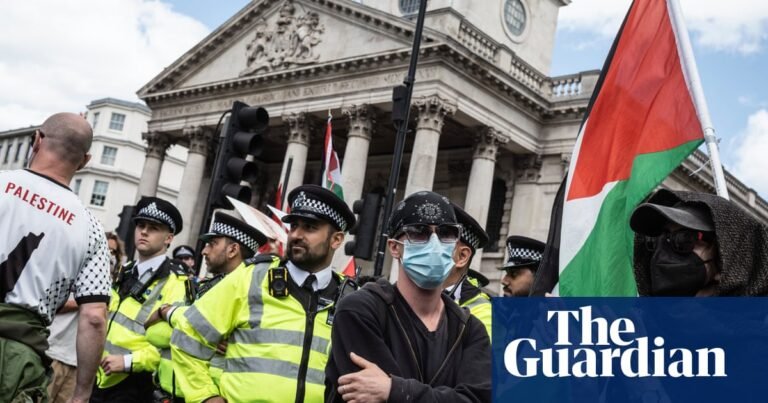The crackdown on protest in England and Wales has been ringing alarm bells for years, but the decision to ban Palestine Action under anti-terrorism laws raises the stakes dramatically.
As the group itself has said, it is the first time the government has attempted to proscribe a direct action protest organisation under the Terrorism Act, placing it alongside the likes of Islamic State, al-Qaida and National Action.
The home secretary, Yvette Cooper, said the proposed ban was evidence-based and had been assessed by a wide range of experts.
“In several attacks, Palestine Action has committed acts of serious damage to property with the aim of progressing its political cause and influencing the government,” she said.
Proscribing the group, which uses direct action mainly to target Israeli weapons factories in the UK, would make it illegal not only to be a member of Palestine Action but to show support for it.
Given that neither its methods nor its targets are unprecedented, a ban is likely to make every group which has an aim of “progressing its political cause and influencing the government” through protest think twice.
Greenpeace UK’s co-executive director, Areeba Hamid, said a ban would “mark a dark turn for our democracy and a new low for a government already intent on stamping out the right to protest. The police already have laws to prosecute any individuals found guilty of a crime.”
Laws passed in recent years have already increased police powers to restrict and shut down protests. At the same time, protesters have often been gagged from telling juries what motivated their actions and have received record prison sentences.
The final straw for ministers appears to have been the embarrassing security breach at RAF Brize Norton in Oxfordshire on Friday, in which two Palestine Action activists broke in and sprayed two military planes with red paint.
But protesters have caused criminal damage to military facilities in the past and even been acquitted for it, while Cooper herself admitted it might not amount to terrorism.
Before becoming prime minister, Keir Starmer successfully defended protesters who broke into an RAF base in 2003 to stop US bombers heading to Iraq. He argued that it was lawful because their intention was to prevent war crimes.
Palestine Action said that pro-Israel groups had lobbied for the ban and there is evidence to support that contention.
Internal government documents released under freedom of information laws have revealed meetings, apparently to discuss Palestine Action, between the government and Israeli embassy officials, although they were heavily redacted. Ministers have also met representatives from the Israeli arms firm Elbit Systems.
The organisation We Believe in Israel, which Labour MP Luke Akehurst used to be director of, began a campaign this month to ban Palestine Action.
In an accompanying report, it stated: “In July 2022, the group was investigated under counter-terrorism protocols following intelligence suggesting contact between some of its members and individuals linked to Hamas-aligned networks abroad (see: Metropolitan Police briefing, classified).
“While the investigation yielded no direct terror charges, it underscored the degree of concern shared by law enforcement agencies over Palestine Action’s increasingly radicalised behaviour.”
It is not clear how or why We Believe in Israel was granted access to classified documents.
There was no reference to links to Hamas in Cooper’s statement but she did refer to Palestine Action as threatening infrastructure which supports Ukraine and Nato, echoing language in We Believe in Israel’s report.
With the government already unpopular among many over its stance on Gaza, the planned ban risks looking like it is based on Palestine Action’s cause rather than its methods.
Akiko Hart, Liberty director, said: “Proscribing a direct-action protest group in this way potentially sets a new precedent for what we do and do not treat as terrorism.
“We’re worried about the chilling effect this would have on the thousands of people who campaign for Palestine, and their ability to express themselves and take part in protests.
“Proscribing Palestine Action would mean that showing support for them in any way – for example, sharing a post on social media or wearing a logo – could carry a prison sentence.”


